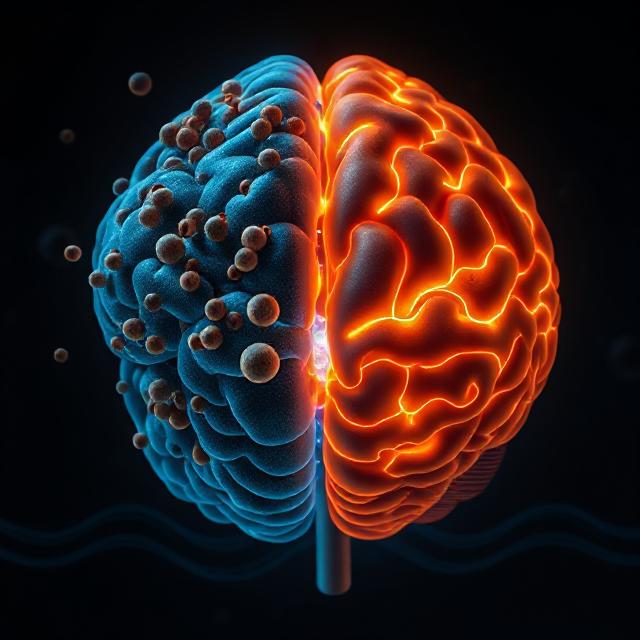
Table of Contents
When to Quit Eating Before Bed for Mental Clarity
The hour you stop eating might do more for your brain than the supplements you take or the hours you study. Emerging science reveals that when you eat influences how clearly you think, especially the next morning.
Late-night eating—once considered harmless—is now tied to foggy mornings, poor memory consolidation, and disrupted deep sleep cycles. But the fix is surprisingly simple: stop eating early enough, and your brain repairs while you rest.
In this article, we’ll explore the timing science behind fasting before sleep, how it impacts brainwave function, and how to use your meal schedule to unlock next-morning clarity, energy, and cognitive sharpness.
🧠 Why Late-Night Eating Hurts Mental Clarity
Here’s what happens when you eat too close to bedtime:
- Insulin and glucose spike, reducing natural melatonin production
- Digestion demands energy, diverting blood away from the brain
- Thermic effect of food raises body temp, disrupting sleep initiation
- REM and deep (delta) sleep decrease, impairing memory and attention
- Circadian misalignment confuses hormonal repair cycles
Even healthy meals—if mistimed—can blunt the brain’s nightly reset. Instead of cleaning itself during sleep, the brain is busy managing post-meal metabolism.
“Sleep is when your brain files, cleans, and calibrates itself. But digestion turns that filing cabinet into a mess.”
— Circadian Biology Research, 2020
🌙 Optimal Cutoff Time: The 3–4 Hour Rule
Most circadian and sleep research agrees on this principle: stop eating 3–4 hours before you plan to fall asleep. Here’s why:
| Sleep Time | Ideal Last Meal Time |
|---|---|
| 9:00 PM | Between 5:00–6:00 PM |
| 10:00 PM | Between 6:00–7:00 PM |
| 11:00 PM | Between 7:00–8:00 PM |
This timing:
- Lets melatonin rise naturally as insulin drops
- Ensures the gut is no longer diverting blood away from the brain
- Keeps body temperature lower for better sleep onset
- Triggers mild ketosis and even early autophagy, aiding neural cleanup
Skipping that late snack may unlock more clarity than your morning coffee.
🔄 What Happens in Your Brain When You Fast Before Bed
When you fast before sleep, a cascade of recovery processes begins:
1. Glymphatic Flow Increases
This system clears waste from the brain, including beta-amyloid—implicated in cognitive decline.
2. Delta Waves Deepen
Early-night slow-wave sleep increases, boosting memory consolidation and mental recovery.
3. Melatonin Peaks Naturally
Without insulin interference, melatonin rises earlier and stronger—guiding sleep architecture.
4. Ketone Metabolism Kicks In
Low glucose + rest = brain runs on ketones, which burn clean and fuel clarity the next day.
5. Autophagy Activates
Fasting promotes cellular repair across the brain’s support structures (astrocytes and microglia).
A 2021 study from Cell Metabolism showed that a 12–16 hour overnight fast improved working memory and attention scores the next day—even without changing sleep duration.
🧘♀️ How to Quit Eating Earlier (Without Feeling Deprived)
✅ 1. Gradually Move Dinner Earlier
Start by shifting your last bite 15 minutes earlier each week until you hit your target.
✅ 2. Eat More Satisfying Meals
Make your final meal high in protein, fiber, and healthy fats. This curbs nighttime hunger and balances hormones.
✅ 3. Add a “Signal Ritual”
Turn off the kitchen light or brush your teeth after dinner to psychologically close the eating window.
✅ 4. Replace Late Snacks with Sleep Cues
Swap chips or chocolate with a cup of magnesium-rich herbal tea, a journal, or soft lighting. Give your brain the right wind-down signal.
✅ 5. Delay Breakfast to Extend the Fast
If you’re not hungry early, don’t force breakfast. You’ll deepen the overnight fast and enhance morning ketone flow.
🛌 Sample Evening Schedule for Mental Clarity
| Time | Action |
|---|---|
| 6:00 PM | Last meal (protein + greens) |
| 7:00 PM | Dim lights + no screens |
| 7:30 PM | Herbal tea or magnesium drink |
| 8:00 PM | Journaling or breathwork |
| 9:00 PM | Sleep |
This routine ensures digestion winds down before melatonin ramps up, allowing your brain to enter deep wave states by midnight.
📊 Case Study: Study Focus After Evening Fasting
A small pilot study on adult learners showed:
- Students who stopped eating by 6:30 PM
- Reported 31% better morning focus
- Had faster recall times during mental math and memory tests
- Experienced deeper sleep as measured by wearable devices
Even when sleep length was unchanged, brain efficiency improved—showing that food timing alone can sharpen the mind.
🔬 Supporting Research
- Satchidananda Panda (Salk Institute): Time-restricted eating enhances circadian alignment and mental performance.
- Cell Reports, 2022: Late eating reduces sleep depth and memory retention in healthy adults.
- Frontiers in Neurology, 2020: Overnight fasting improves morning executive function and alertness.
🔁 Final Thoughts: Mental Clarity Starts the Night Before
Cognitive sharpness isn’t just about how you wake up—it’s about what you don’t do the night before. Quitting eating 3–4 hours before sleep may be the simplest focus upgrade you haven’t tried yet.
Your brain wants to heal. Give it the quiet, fasted window it needs.
Don’t feed late-night fog.
Fuel your brain by fasting before bed.